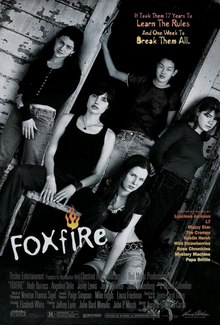Usually, it will take me at least a couple of weeks to read through a book. This may be because I most often read non-fiction. I'm also noticing many of those non-fiction books are written by men (albeit pro-feminist, radical men). There's something refreshing about these books, though. Whether it is because they are not non-fiction theory, or because they are written by women, or both. Here are a few I've read and/or watched most recently:
 Lakota Woman, both a book and film, is an amazing autobiography of Mary Crow Dog (now Mary Brave Bird), feminist and former member of the American Indian Movement (A.I.M.) She tells her experiences growing up on a reservation and being forced to attend a boarding school. Her rejection of assimilation into white culture leads her into the revolutionary A.I.M., with whom she stages an occupation at Wounded Knee in the early 1970's. At the same time of her radicalization, she also rekindles participation in sacred Lakota spiritual traditions. This story is filled with history and the personal narrative paints the picture of a brave and inspiring human being fighting for a better world. Favorite quote:
Lakota Woman, both a book and film, is an amazing autobiography of Mary Crow Dog (now Mary Brave Bird), feminist and former member of the American Indian Movement (A.I.M.) She tells her experiences growing up on a reservation and being forced to attend a boarding school. Her rejection of assimilation into white culture leads her into the revolutionary A.I.M., with whom she stages an occupation at Wounded Knee in the early 1970's. At the same time of her radicalization, she also rekindles participation in sacred Lakota spiritual traditions. This story is filled with history and the personal narrative paints the picture of a brave and inspiring human being fighting for a better world. Favorite quote: The Color Purple is a novel by Alice Walker that speaks to sisterhood and struggle of African-American women in the southern U.S. only shortly after slavery was formally abolished. This classic story follows Celie as she learns to appreciate her body, speak up and fight back against abusive and controlling men, and struggle for her humanity and self-determination. Favorite quotes:
The Color Purple is a novel by Alice Walker that speaks to sisterhood and struggle of African-American women in the southern U.S. only shortly after slavery was formally abolished. This classic story follows Celie as she learns to appreciate her body, speak up and fight back against abusive and controlling men, and struggle for her humanity and self-determination. Favorite quotes:I loves Harpo, she say, God knows I do. But I'll kill him dead before I let him beat me. Now if you want a dead son-in-law you just keep on advising him like you doing. She put her hand on her hip. I used to hunt game with a bow and arrow, she say.
She say, My first step from the old white man was trees. Then air. Then birds. Then other people. But one day when I was sitting quiet and feeling like a motherless child, which I was, it come to me: that feeling of being part of everything, not separate at all. I knew that if I cut a tree, my arm would bleed. And I laughed and I cried and I run all around the house. I knew just what it was. In fact, when it happen, you can't miss it.
 Foxfire is a film, based on a book by Joyce Carol Oates, about a group of girls in high school who meet in unity to stop a male teacher from sexually abusing them and others. After physically confronting him, the loyalty they feel to each other grows as does their embracing of sisterhood and the will to fight back. I absolutely loved the uncompromising attitudes against men's abuse of women in this film. It did have it's drawbacks, though, in that like many "mainstream films", there was unnecessary sexualization of female characters. A favorite quote:
Foxfire is a film, based on a book by Joyce Carol Oates, about a group of girls in high school who meet in unity to stop a male teacher from sexually abusing them and others. After physically confronting him, the loyalty they feel to each other grows as does their embracing of sisterhood and the will to fight back. I absolutely loved the uncompromising attitudes against men's abuse of women in this film. It did have it's drawbacks, though, in that like many "mainstream films", there was unnecessary sexualization of female characters. A favorite quote:If you ever put your hands on me again, I'm gonna snip your little nuts off with my toenail clippers!

